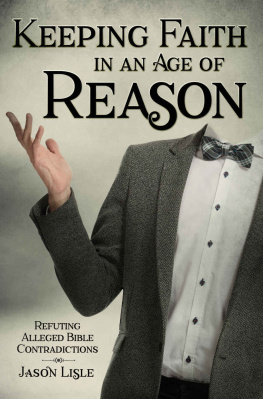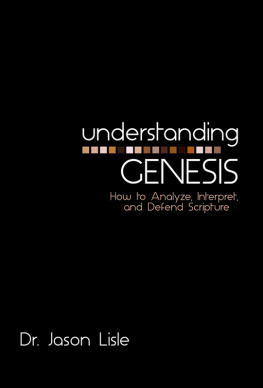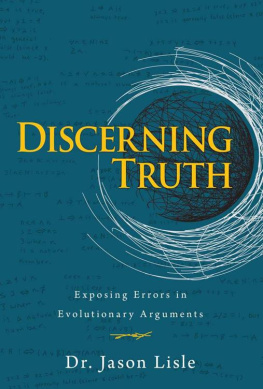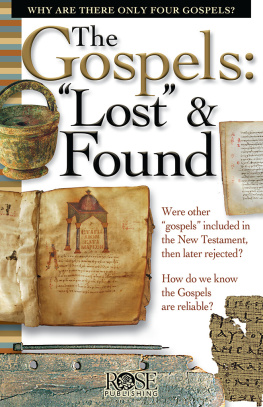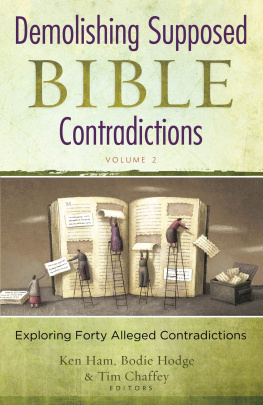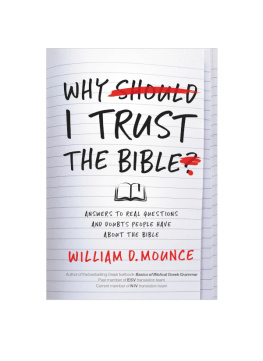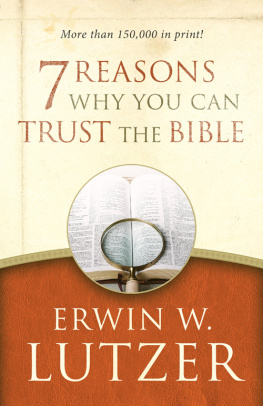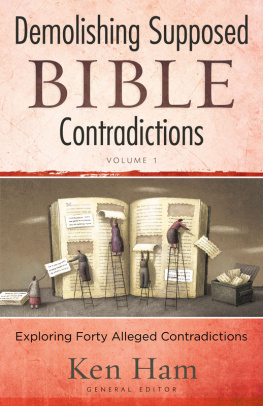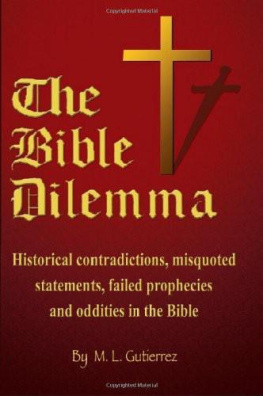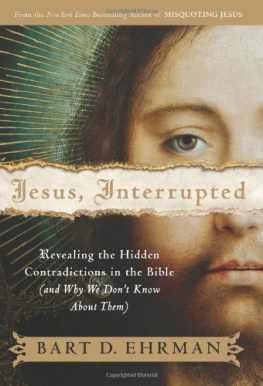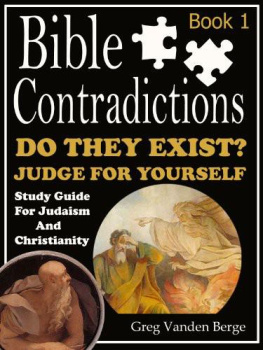First printing: October 2017
Copyright 2017 by Jason Lisle. All rights reserved. No part of this book may be used or reproduced in any manner whatsoever without written permission from the publisher, except in the case of brief quotations in articles and reviews. For information write:
Master Books, P.O. Box 726, Green Forest, AR 72638
Master Books is a division of the New Leaf Publishing Group, Inc.
ISBN: 978-1-68344-092-5
ISBN: 978-1-61458-605-0 (digital)
Library of Congress Number: 2017954605
Cover by Diana Bogardus
Unless otherwise noted, Scripture quotations are from the New King James Version (NKJV) of the Bible, copyright 1982 by Thomas Nelson, Inc. Used by permission. All rights reserved.
Scripture noted NASB is from the New American Standard Bible, copyright 1960, 1962, 1963, 1968, 1971, 1972, 1973, 1975, 1977, 1995 by The Lockman Foundation. Used by permission.
Please consider requesting that a copy of this volume be purchased by your local library system.
Printed in the United States of America
Please visit our website for other great titles:
www.masterbooks.com
For information regarding author interviews,
please contact the publicity department at (870) 438-5288.
Acknowledgments
I am very grateful for the support of family and friends in my life and in my research. I extend a special thanks to Dr. Jim Johnson, and Dr. Ken Gentry for reviewing this book and providing helpful suggestions to improve it. I pray that this book challenges critics to study the Scriptures carefully rather than simply reacting to a cursory or careless reading. I further pray that this book will encourage believers and rekindle an interest in biblical research.
Contents
Introduction
W e have all heard the claim You cant trust the Bible its full of contradictions. But when asked specifically which verses supposedly contradict each other, most Bible-deniers cant actually produce any examples. They have heard that the Bible contradicts itself, and they have merely repeated that claim in ignorance, without bothering to check. This shows that most Bible critics are not interested in rational scholarship. Instead, they simply dont emotionally like the Bible, so they choose not to believe it. They then uncritically accept any claim they hear that happens to reinforce their uninformed choice. For the Bible critic, there is no need to research claims to see if they are actually true . It is enough that they support the critics preconceived choice.
The Internet is a great place to find examples of such rhetoric. Moreover, the Internet allows the uninformed critic seemingly to support his claim by linking to articles written by other uninformed critics. Some websites include long lists of claims of biblical contradictions, sometimes with several hundred entries. These lists look impressive. And it would seem to prove the critics point. With hundreds of contradictions, how could anyone trust the Bible? Many critics in their Internet debates mindlessly cite these lists as the definitive refutation of Scripture. After all, surely these hundreds of contradictions have been thoroughly researched, deal carefully and fairly with the text, and represent genuine contradictions, right?
As it turns out, this is not the case. When we actually bother to check, we find that not one of the hundreds of listed examples is genuinely contradictory at all. In most cases, it is clear that the critic has simply not read the text carefully or in context. In other cases, it is clear that the critic is not reasoning properly he has made a mistake in logic. And in still other cases, the critic has merely cited a compatible difference , which leads me to believe that some critics really dont understand what a contradiction is.
To demonstrate the veracity of Scripture, this book will address every alleged Bible contradiction that I have seen posted on the Internet. Whereas there may be a few obscure claims of contradictions that I have not seen, this list covers the most often used examples. It is instructive to go through each of these alleged contradictions and read the text carefully to see what the Bible actually states. This helps us to understand the biblical text better, which is always a blessing. And it increases our confidence in Scripture, showing that even the best of the best Bible critics have not been able to find a single, genuine contradiction in Scripture. It further demonstrates that the Bible critics choice to reject Scripture is not a rational one but an emotional one driven by the critics hatred of God. Thus, the critics lists of hundreds of alleged contradictions shows only his own lack of scholarship and ironically confirms the truth of Romans 1:1825.
All of the claims below have actually appeared on the Internet. In fact, a common list that critics cite contains every item we address in this book. Before we go through the list in its entirety, lets briefly discuss what a contradiction is and what it is not .
What Is a Contradiction?
It is always helpful to define any relevant terms at the outset of the discussion. And since our topic involves the concept of contradiction, we must define this term. Two statements are said to be contradictory when one asserts what the other denies . The statement The sky is blue is contradictory to the statement It is not the case that the sky is blue. Both statements together form a contradiction: The sky is blue and it is not the case that the sky is blue. One can turn any statement into its contradictory statement by adding the prefix, It is not the case that.
In logic, a contradiction is defined as A and not- A at the same time and in the same relationship or sense. Here A is any truth claim, which in logic is called a proposition. Any given proposition is either true or false. And the contradictory proposition will have the opposite truth value. So, if A is true, then not- A is false. Conversely, if A is false, then not- A is true. Therefore, the combination of A and not- A must always be false.
The qualifier at the same time is very important. It is not a contradiction to say The sky is blue today, and it is not the case that the sky was blue yesterday because the two claims address two different times. Some things change with time, so A might be true today while not- A is true tomorrow. For example, God required circumcision of male children for Israelites during the time of the Old Covenant (Genesis 17:1013). At a later time, under the New Covenant, God no longer required circumcision (Galatians 5:16). There is no contradiction between the claim God requires circumcision at one time and the claim God does not require circumcision at a later time. Yet, this is one of the alleged contradictions that Bible critics have posted online (see #185).
The qualifier in the same relationship or sense is also very important. It is not a contradiction to be unmarried in the sense of not having a spouse, and yet married to ones job. The sense of the word is different in the two cases, and so one claim does not deny what the other asserts. There is no contradiction in the claim Bear one anothers burdens in the sense of helping those in trouble, and bear your own burden in the sense of taking responsibility for your own obligations. Yet, the critics have posted this very claim as addressed in #172. The principle that we should not answer a fool according to his folly in the sense of becoming like him is perfectly compatible and does not contradict the principle that we should answer a fool according to his folly in the sense of reflecting his absurdity back to him so that he cannot be wise in his own estimation. The critics make this very mistake as illustrated in #299.
Next page
